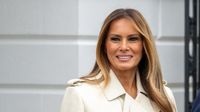The White House Rose Garden, long a symbol of presidential tradition and American history, has undergone a dramatic transformation that has both captivated and divided the nation. This summer, President Donald Trump and First Lady Melania Trump ushered in a new era for the iconic outdoor space, replacing the lush Kennedy-era lawn with a sprawling patio of concrete pavers, striped umbrellas, and a distinctly Mar-a-Lago aesthetic. As of August 2025, the renovation is complete and an official reopening ceremony is expected soon, marking the most significant changes to the Rose Garden since the 1960s.
On August 19, 2025, White House press secretary Karoline Leavitt led reporters on a tour of the newly renovated garden, giving the press corps a close-up look at what has become a strikingly different landscape. As journalists strolled across the new stone patio, President Trump’s personal playlist blared from newly installed speakers—a mix that included classics like "A Whiter Shade of Pale" by Procol Harum and Elvis Presley’s "Are You Lonesome Tonight?" According to PEOPLE, the music was part of a speaker test in preparation for what Trump has described as "the best event in White House history."
The most talked-about feature of the new space? The yellow-and-white-striped umbrellas that now dot the patio, providing shade over metal tables and drawing instant comparisons to outdoor chain restaurants and hotel pools. When asked about the umbrellas, Leavitt was candid: "Yeah, I mean, they are literally the umbrellas from Mar-a-Lago," she said, before clarifying they were purchased from the same vendor as those at Trump’s Florida estate, not physically relocated from there. The umbrellas, along with the stone patio, have quickly become the focal point of both praise and ridicule on social media.
The overhaul is a far cry from the Rose Garden’s former incarnation. For decades, the garden’s central lawn—installed during President John F. Kennedy’s administration in the 1960s—served as the backdrop for high-profile events, press conferences, and state ceremonies. The Kennedy-era design was celebrated for its floral symmetry, with roses and crabapple trees framing a pristine green space. Melania Trump, who led a controversial redesign in 2020 that included removing the crabapple trees and narrowing the lawn to add a limestone walkway, was once again involved in this latest renovation, though her role this time appears more muted.
Leavitt told reporters that the first lady is satisfied with the new patio, saying, "She is. I believe so, yeah." However, Melania Trump has not made any public statements about the project, fueling speculation about her level of involvement and interest. As noted by People and The List, Melania’s public presence as first lady during Trump’s second term has been notably limited. She rarely attends political events, her social media activity is infrequent, and she has been largely absent from the spotlight—appearing mainly at events involving children or significant White House ceremonies.
Despite her silence, Melania’s earlier redesign in 2020 remains untouched in some respects. The rose bushes she planted still line the garden’s borders, preserving a nod to tradition even as the central lawn has been replaced. According to PEOPLE, Leavitt confirmed, "The roses are still here," when asked if the space retains its historic name. Yet, the overall effect is undeniably different. The garden’s once-green centerpiece is now a sea of gray stone, interrupted only by the vibrant umbrellas and patio seating.
The rationale for the renovation, according to President Trump, is rooted in practicality. In interviews with The Spectator and Fox News’ Laura Ingraham, Trump explained that the grass was often wet and unsuitable for visitors—especially women wearing high heels. "You know, we use [the Rose Garden] for press conferences, and it doesn’t work because the people fall," he said. "Women, with the high heels, it just didn’t work." He elaborated further, "The grass was wet. Their heels are going right through the grass, like four inches deep." Trump is confident the new design will be both beautiful and functional, asserting, "It’s going to be beautiful... I think it’s actually going to look better."
The renovation project, which began in early summer 2025, was overseen by the National Park Service and funded by the Trust for the National Mall. Work wrapped up in mid-August, just in time for the president’s planned reopening event. The redesign removed the Kennedy-era lawn, replacing it with concrete pavers while retaining the outer rose beds. The project is part of a broader series of modifications Trump has made to the White House during his second term, reflecting his personal taste and penchant for dramatic, high-profile changes.
Reactions to the new Rose Garden have been predictably polarized. Supporters of the president have praised the transformation as bold and necessary, lauding the practical benefits and the fresh look. Critics, on the other hand, have derided the patio as cold and uninviting, likening it to the outdoor seating of chain restaurants rather than the dignified setting of presidential history. As NPR noted, it is just the latest in a string of Trump-era modifications to the White House that have sparked intense debate about aesthetics, tradition, and the meaning of public spaces.
Amid the controversy, questions linger about Melania Trump’s true feelings regarding the overhaul. While Leavitt’s "I believe so, yeah" response suggests approval, the first lady’s silence has only fueled rumors that she is increasingly hands-off in her White House role. According to The List, a source close to Melania said after the 2025 inauguration that she "doesn’t believe she has obligations in the political world" and would only participate in causes or events if she has the time and interest. Whether she will appear at the forthcoming reopening ceremony remains to be seen.
One thing is certain: The White House Rose Garden is no longer the same. Its new look is a bold statement, one that reflects the personal tastes and priorities of the Trumps as much as it does the evolving nature of presidential tradition. As the nation awaits the official reopening, the garden stands as a testament to change—controversial, unmistakable, and, for now, undeniably Trump.




